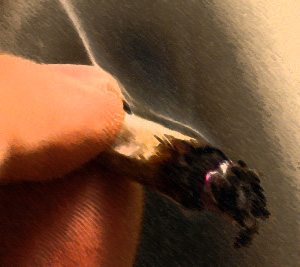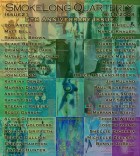You’ve been an editor with SmokeLong for about nine months now. When looking at submitted pieces, what jumps out at you?
Actually, it’s been a year now. Can you believe that?! It doesn’t seem that long, does it?
I know a lot of editors have a list of pet peeves. Maybe I haven’t been at this editing thing long enough, but a lot of the pet peeves I hear aired don’t bother me. Bars, dead babies, full names. All fine by me. As long as the story is written well. As long as the story isn’t boring. I really don’t like to be bored when reading. It’s true that I’m a sucker for dark, edgy stories. I also like quirky characters. Overall, if a story makes me look at something anew, if it makes me think, surprises me with language, or contains something unusual, it’ll jump out at me. Usually, I like it when a story means something, too. But not always.
For me, one of the things that really stands out about “Gathering” is that it uses a framing device that actually works, which seems so rare in a flash. The men that Hendy hasn’t met bookend her story, in a way that deepens the story, rather than just being a writer’s tool. What is it about “Gathering” that would excite you, as an editor?
Thanks, Dave. When my husband read this story he said, “That’s a weird story, love.” I think that’s what I like most about it. It is weird. Who eats rubber bands? But the story also means something. It’s not just about a woman who has a freaky habit of eating rubber bands. She’s lonely. She’s trying to fill her vacant spaces. I also like that it’s written in the omniscient voice. You don’t see that point of view very often, especially in flash. That was Kathy Fish’s idea. I owe her that.
You’ve conducted very nearly all of the interviews for SmokeLong since Randall Brown stepped down, and have been doing the amazing Writer’s Profile Project for a couple years now. How has your writing process changed from coming at the literary world from this angle?
Good question. Hard question. I’ve learned a lot about how other writers write—their routines, their angles, how they approach the industry, their successes and disappointments. It’s amazing how open people have been. More than anything, they’ve given me courage. I’m still learning how that has translated into my writing process, but I’ve found myself interested in styles and genres I never thought I’d be into.
Similarly, how has editing affected your writing process? More specifically, how has editing flash affected you?
I think every writer should spend some time editing for a journal. It’s incredibly enlightening. For example, you learn that editors are actually people. Who knew! And not to take rejection personally, because a rejection is just an editor’s opinion.
I’m still figuring out what it takes to be a good editor. You and the other staff members are much better at taking a piece and shaping it to make it stronger, for example. I’ve learned a lot by watching you all, and now, when I turn to my own work, I find it easier to recognize extraneous words, or tired phrasing.
I’ve always loved flash, but editing for SmokeLong has made me even more excited about it. I think flash is gaining credibility, and more writers seem to be making it their focus. A lot of talented writers, too. I’m especially glad to have worked with the first Fish Fellowship recipient, Beth Thomas, and the current title holder, Stefanie Freele. Both women are extremely talented, and working with them in that capacity has been very rewarding.
I can’t think of a better way to re-word the question you’re asking editors and former editors of SmokeLong, so I’m going to throw your question back at you verbatim: This issue marks SmokeLong‘s fifth anniversary, which has me thinking about longevity and growth. There’s no denying the literary arena is a fickle one, with journals coming and going, writers shooting onto the scene then falling into a long hiatus, editors changing houses, agents merging, and the trends! Don’t even get me started! How do you, as a writer, endure the ups and downs? Have you experienced any setbacks? What measures have you taken to grow?
Endure the ups and downs. Shit. (Can I say that here?) I haven’t endured the ups and downs. At least not well. Very often, like every five minutes, I get fed up and decide I should do something else with my life. I make plans to get my real estate license, to move to Colorado and open a bookstore, to find someone to pay me to cook them dinner at night. Better yet, to do all three! How fun would that be?!
You could say that I’m in the biggest setback of my life. Yes, you could definitely say that. I’ll start a piece and abandon it. I’ll look at a “finished” story and move it to the burn pile. I have no desire to submit anything anywhere. Reading feels like a chore. Slump, slump, slump. SLUMP. I’m in one. Big time. I’m admitting it because I hear that’s the first step in overcoming it. Please tell me that’s true. I am happiest when I calm down, go with the fickle flow, and just write, however. I want to be in that place again. I’m going to work hard at getting back there.
To grow, I plant myself in full sun and ignore that voice in my head that says: skin cancer.



 The core workshop of SmokeLong Fitness is all in writing, so you can take part from anywhere at anytime. We are excited about creating a supportive, consistent and structured environment for flash writers to work on their craft in a community. We are thrilled and proud to say that our workshop participants have won, placed, or been listed in every major flash competition. Community works.
The core workshop of SmokeLong Fitness is all in writing, so you can take part from anywhere at anytime. We are excited about creating a supportive, consistent and structured environment for flash writers to work on their craft in a community. We are thrilled and proud to say that our workshop participants have won, placed, or been listed in every major flash competition. Community works.